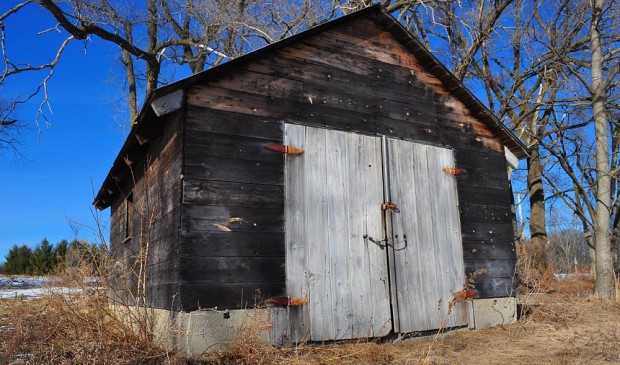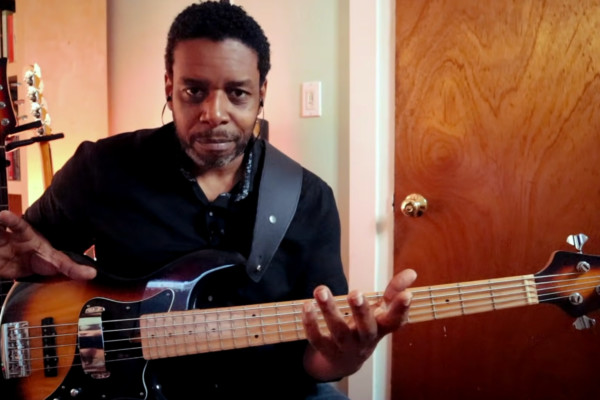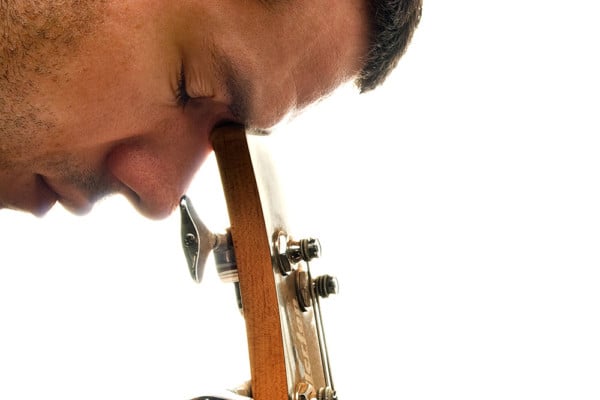Bass Players: Get Out of the Shed and Into the World

Q: I practice a lot, but I don’t get to play music with other people all that often. How important do you think it is that I play with other actual humans?
A: The short answer? Extremely important.
There is no shortage of reasons why this is important, but here are the most important in my book:
Feedback!
What you are doing may be very cool to your ears, but it might not always be the most musical thing. Also, you may be on the verge of something pretty cool and all you need is a slight suggestion from someone and… WHAM! there it is!
Think about it, is there anything in life that you can truly master without instruction, guidance or some kind of interaction from others? Maybe, but I’d bet it comes much slower (if at all).
Having someone there to bounce musical ideas off of both verbally and musically is invaluable.
Seek out musicians who are more musically advanced than you too, and play with them. This gives you immediate insight into what else is possible and provides the opportunity to ask questions and get some direct answers to things that might take you weeks, months or years to discover on your own.
On the flip side, playing with others that are at your level provides you with immediate feedback in a low-pressure environment. Someone there may have a better grasp on “A” while you have a better grasp on “B” and, if you two get together, you will both understand both A and B much more quickly. Playing with those who are less developed than you are is also helpful as it provides you with an opportunity to teach, thereby forcing you to articulate what it is you know which reinforces what you know in your head in a big way. I’ve learned more from teaching than I have from gigging or rehearsing in many ways. Teaching is one of the most fantastic (and rewarding) ways to grow as a player. I often find myself learning as I speak because I am forced to articulate a concept and I almost always make a discovery in the process.
Fun = elevated attention span = more knowledge per hour (kph?)
The act of making music and exploring your limits is fun (or at least it should be). When you’re having fun, you will get more out of the experience and can do it for longer periods. For those who hate practicing by yourself and often have to struggle in order to keep yourself focused, you probably find that when you’re making music with others, hours can roll by without me even considering doing anything else… checking email, glancing at a website, flipping through iTunes to look at new music and all of the other distractions we face today. You’ll be 100% focused on the task at hand and learning more because you’ll want to be focused at the task at hand.
Reward
If you record your rehearsals or jam sessions (highly recommended, by the way) you also have a keepsake as well as a means to critique yourself (and the group), which leads to further development.
As part of my routine, I love flipping through old recordings I have on my hard drive and even more important: love hearing my development as a player as time goes on.
This also allows you to listen back that night or the next day and evaluate what you are playing and how it impacts the music as a whole. We all know how hard it can be to listen to the band as a whole when we are performing in the moment. This type of feedback is invaluable.
From concept to reality
Rehearsing or jamming is also the perfect time to experiment with ideas you’ve played with while practicing at home. I don’t care how cool the loops are you create at home to play along with, you will never truly know how an idea works musically until you play it with other humans who will react to it.
For example, say you’ve been shedding different modes over a one chord vamp. When you are practicing at home to a loop or drone, nothing ever changes regardless of what you play. In real life, musicians react to the music and to the soloist and players might start adding other chords to the vamp, changing their rhythms to build intensity, or even cue a different portion of the song (forcing you to alter your mindset and work your ears as your platform shifts).
It’s easy to see and conceptualize how playing with other musicians can not only challenge you in new ways but lead to interaction and feedback that can greatly improve your abilities in less time.
Imagine trying to learn a new language by only ever reading out of a book and listening to Rosetta tapes. Now imagine how much faster you’d learn if you were in a group of people (all of whom were learning that same language) trying to have a conversation, play a board game or go out to a restaurant only using that language. You would become conversationally adept and learn new words, phrases and usage in far less time and with far more functionality than you ever could at home with your headphones on and someone repeating the word “cat” in French over and over again.
Get out there and find someone to make and explore music with. You have absolutely nothing to lose and absolutely everything to gain!
As always, I love hearing your feedback. Share your thoughts and experiences on the benefits of playing with others in the comments.
Photo by Tim Lorenz
Have a question for Damian Erskine? Send it to [email protected]. Check out Damian’s instructional books, Right Hand Drive and The Improviser’s Path.




Great advice, great response. I feel that “Seek out musicians who are more musically advanced than you” is the most salient point of the article and something I totally agree with and actively try to do to improve my playing. It doesn’t have to be more advanced in terms of physical chops, reading, or some technical aspect, but, more so in terms of songwriting, musicality, feel, groove / timing, layering of sounds, use of space…
Damn right, an you guys who are guesting my my CD are driving me to work harder!
I always try to play with folks better than myself – relying on my vocals to keep me in the game!
finding players to play with isn’t easy some markets not a lot of venues to play either! sad but true.
two words…. Open Jams! they force you to think on your feet, they force you to figure things out on the fly, they force you to improvise, they force you to keep your mind open. they make you better! they made me better for sure. I’ve gone to a try-out for a band, and they did an Iron maiden song I’ve never played beofre, but used to love over a decade ago. I did it on the fly and it was awesome! I credit open jams for that.
cool.
The problem used to be that people were so eager to gig that they would start playing in bands before they had any knowledge or technique. Now people are afraid to gig until they watch “just one more” Youtube video or take another online lesson…It’s so weird to me.
The best school is the road.
being unprepared never stops me!
This happens every few years, though. I had a bunch of students in the late 90s who were in high school and had played for years, but didn’t play in bands. But about ten years ago, there developed a really thriving band scene amongst high school kids. Now we’re back to the late 90s again. I had some kids come up to me at a gig last summer talking about how they would rather sign with this one label than this other, but they didn’t have their whole band put together yet. Ugh…
Great advice. I would add that jamming with musicians that play different styles (blues, classic rock, country, whatever) will help you develop your own style. Going to jam sessions will help you learn fast and think on your feet, because bass players (and drummers) are at the mercy of singer/guitarists who take centre stage and play their stuff. If you don’t know it, you’re going to have to fake it, learn it on the spot or walk away. And if you fall in with other players you can groove with and be treated with respect in the creative process, consider yourself lucky. Because when the magic happens and the whole band is groovin together, it is priceless and makes up for all the BS you waded through to get to that magic moment. You can’t be afraid to get some shit on your boots…it makes kicking ass much more fun.
personally, I think getting out there and jamming is VERY important. Unfortunately I don’t have near as many chances to get out and jam as I’d like. I’ve found that without being in a band or at least jamming with others regularly the motivation to learn complete songs is lacking. When I have a reason to do it besides for myself, I’m more likely to do it and will do it faster.
I couldn’t agree more! But finding people to have a jam session with doesn’t come easy. Keep practicing and ALWAYS be on the lookout for EVERY opportunity… even if it means having to eat a slice of humble pie first.
Many times, we sit in the studio coming up with bass lines that seem to us to be a vision from the Gods. Ever play that line in practice that seems to come out of nowhere but smokes everything you’ve done? The idea for that line came from somewhere. Sometimes I’ll sit and listen to a whole bunch of Marcus/Stanley tunes and then later start working some things. Somewhere, certain little licks and phrasing comes through courtesy of something I’d heard. Then, it really gets the acid test when we jam with others. As a jazz/funk fusion player, I often get ideas from the other players. This helps to sometimes smoothen things out and as the article said, the feedback and reactions from others can’t happen in practice or even playing off a drum track. It don’t really change no matter what lines you come up with. Also, there’s the timing thing. Even with a metronome, what seems to work on your own may need some adjusting really stay locked when playing with others.